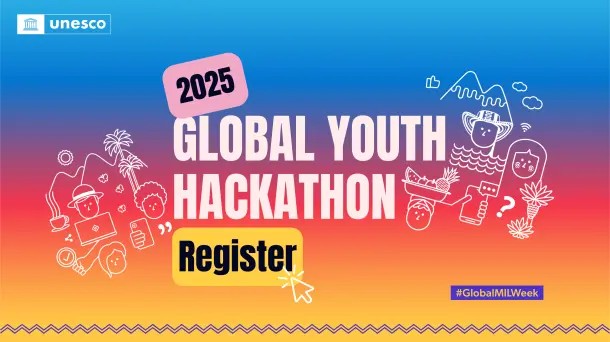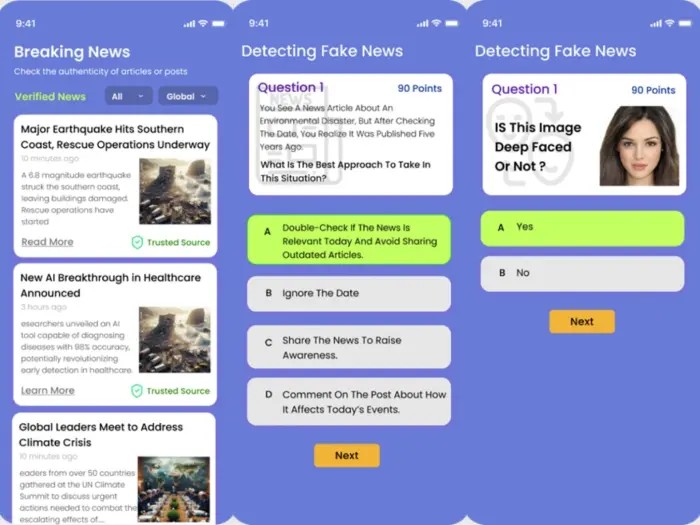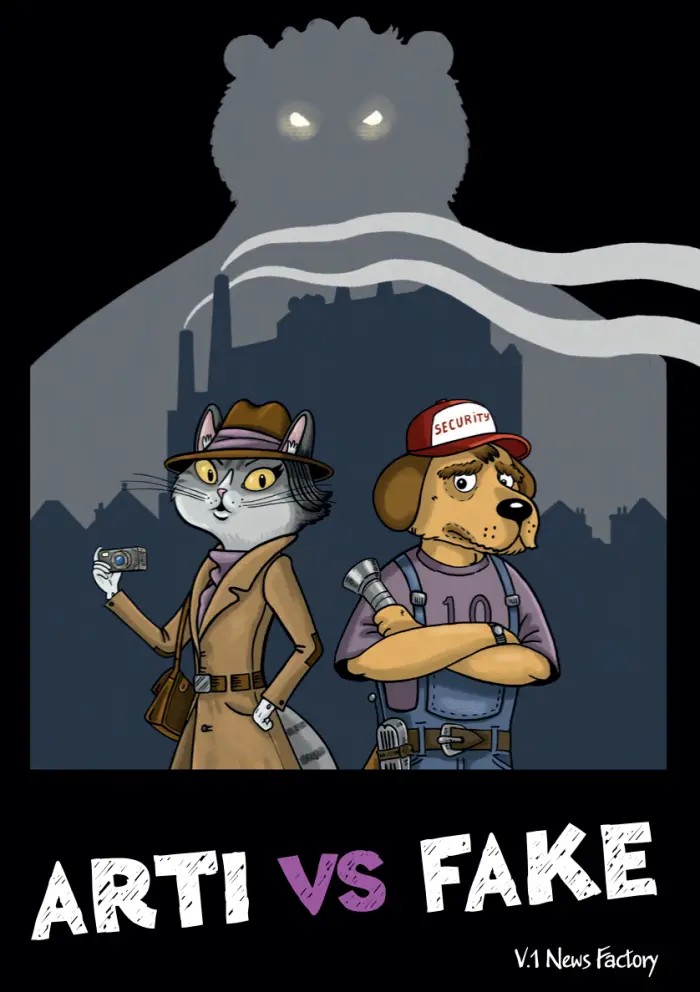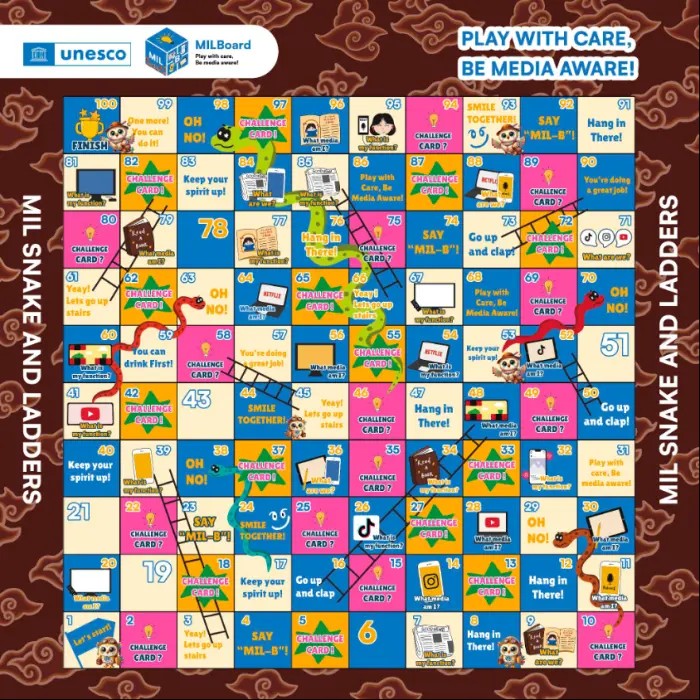UNESCO Youth Hackathon 2025

Theme: Youth Leading the Way – Building MIL Solutions for Impact
Event Date: 23–24 October 2025
Location: Cartagena, Colombia
Application Status: Open for Registration
Target Audience: Youth aged 18–30
Overview
UNESCO has launched the 2025 edition of its Youth Hackathon, a central initiative of Global Media and Information Literacy (MIL) Week, aimed at empowering young people to address pressing challenges in today’s complex digital information ecosystem. The Hackathon provides a platform for youth to design and present innovative solutions that promote media and information literacy, digital rights, and civic engagement.
Building on the momentum of the 2024 edition, which attracted over 200 teams from 68 countries, this year’s Hackathon will expand its global reach and deepen its focus on actionable impact. Participants will be guided through a mentoring program and invited to co-create practical, youth-led responses to issues such as AI ethics, disinformation, online hate speech, platform monopolies, and threats to information integrity.
Key Objectives
The Youth Hackathon 2025 seeks to:
- Empower youth to become informed, responsible, and active digital citizens.
- Foster innovation and support youth-led solutions to information and communication challenges.
Amplify youth voices, ensuring visibility, recognition, and support for their ideas.
- Generate real-world impact through projects that are scalable, sustainable, and aligned with the values of open access, inclusivity, and information equity.
Eligibility
Applicants must meet the following criteria:
- Be between 18 and 30 years of age at the time of registration.
- Participate either individually or as part of a team (teams may include up to five members).
- Demonstrate an interest in media literacy, digital ethics, information access, civic technology, or related fields.
There are no nationality or academic prerequisites. Applicants from all countries and disciplines are encouraged to participate. UNESCO especially encourages applications from underrepresented groups, including youth from marginalized communities and conflict-affected regions.
Hackathon Format
Participants will follow a structured process:
- Registration: Applicants must complete an online registration form with accurate team or individual details.
- Mentoring Phase: All registered participants will receive access to a free online mentoring program in August 2025, conducted by international experts in digital media, technology, education, and civic engagement.
- Proposal Submission: Final project proposals must be submitted by the designated deadline. Submissions will be evaluated by an international jury on criteria such as originality, feasibility, impact, and alignment with the theme.
- Final Selection: Winning teams will be invited to showcase their projects at the Global MIL Week Conference in Cartagena, Colombia, on 23–24 October 2025. UNESCO will cover travel and accommodation expenses for the selected teams.
What Kind of Proposals Are Sought?
UNESCO encourages solutions that are:
- Innovative: Combining new approaches or technologies to solve persistent MIL challenges.
- Scalable and Sustainable: Designed for replication or adaptation in other contexts or communities.
- Community-Driven: Centered around local needs and involving diverse stakeholder input.
- Ethically Sound: Aligned with human rights, freedom of expression, and digital inclusion.
Examples might include mobile apps, toolkits, educational games, media campaigns, policy frameworks, or digital platforms that improve access to reliable information, counter disinformation, promote fact-checking, or enhance civic engagement through media literacy.
Benefits for Participants
- Access to expert mentoring and international networking opportunities.
- Official recognition by UNESCO for participation and achievement.
- Presentation of winning projects to a global audience during Global MIL Week 2025.
- Full sponsorship for travel and accommodation for selected finalists.
- Inclusion in global MIL networks and ongoing capacity-building initiatives.
How to Register
Interested individuals or teams must submit their registration via UNESCO’s designated online portal. All team members must be listed at the time of registration to qualify for the mentoring phase.
For questions or technical support, applicants may contact: MILunit@unesco.org
Important Dates
- Registration Deadline: To be confirmed
- Online Mentoring: August 2025
- Proposal Submission Deadline: To be announced after mentoring phase
- Final Event: 23–24 October 2025, Cartagena, Colombia
UNESCO applies a zero-tolerance policy toward all forms of harassment, discrimination, and exploitation. The organization encourages equitable participation and strongly supports diversity and inclusion.
For more opportunities such as these please follow us on Facebook, Instagram , WhatsApp, Twitter, LinkedIn and Telegram
Disclaimer: Global South Opportunities (GSO) is not the hiring organization. For any inquiries, please contact the hiring organization directly. Please do not send your applications to GSO, as we are unable to process them. Due to the high volume of emails we receive daily, we may not be able to respond to all inquiries. Thank you for your understanding.
The Youth Hackathon is a flagship initiative of UNESCO’s Global Media and Information Literacy (MIL) Week, empowering young people worldwide to tackle urgent challenges in today’s digital information landscape. These include the rise of AI, the spread of mis- and disinformation, online hate speech, platform dominance, and threats to information integrity.
Following the success of the 2024 edition – which brought together 202 teams from 68 countries – UNESCO is gearing up for an even more impactful 2025 edition.
Under this year’s theme, Youth Leading the Way: Building MIL solutions for Impact, UNESCO calls for youth aged 18 to 30 to collaborate, innovate, and lead with their ideas. All participants will benefit from free online mentoring by international experts before the final submission. Each winning team can select 2 representatives to present the projects at the Global MIL Week Conference on 23-24 October 2025 in Cartagena, Colombia – with flight and accommodation covered by UNESCO.
Winners of UNESCO’s Youth Hackathon 2024 Shape the Future of Media and Information Literacy
Marking its sixth year, the 2024 edition set a new record with 202 teams from 68 countries submitting projects under the theme “Youth Leading the Way: Media and Information Literacy and the New Digital Frontiers of Information”.

UNESCO
7 February 2025
“Taking part in the Youth Hackathon was a truly transformative experience. Representing Indonesia and presenting our project on an international platform was an honor, but the real impact came from the connections we built in Amman. Engaging with youth from diverse countries and backgrounds highlighted the power of collaboration and cultural exchange“, said Muhammad Rafi Aurelia from Indonesia, one of the 2024 winners for his project MILBoard.
Muhammad, along with three other teams from Madagascar, Iraq/UAE/Egypt, and Ukraine, attended the closing ceremony of the Global MIL Week Feature Conference in Amman on 30 October 2024. They presented their project, aiming to raise visibility and support to further develop their ideas.
The Youth Hackathon is a flagship initiative in UNESCO’s ongoing efforts to engage young people in shaping the future of media and information literacy. Each year, UNESCO invites young innovators to submit projects tackling misinformation, through mobile applications, podcasts, educational tools, and community-based interventions.
This year’s participants also benefited from a two-day online mentoring program covering media literacy, disinformation challenges, hate speech, and coding fundamentals. Expert mentors from DW Academie, TeensinAI, and SAP guided teams through this preparation phase.
After a rigorous review by an independent international jury, four teams were selected as winners:
Mobile Application: MAHW
Developed by a collaborative team from Iraq, the United Arab Emirates, and Egypt, MAHW, inspired by the Arabic word for “erasing”, is a mobile application designed to combat misinformation and enhance media literacy. Featuring gamified learning, AI-powered fact-checking, and interactive quizzes, MAHW equips users with essential tools to identify and counter misinformation. With 60% of its core features already developed, the project demonstrates significant potential for real-world impact.

Community-Based Intervention: ARTiFAKE
Representing Ukraine, ARTiFAKE, a blend of “Art Invades Fakes”, leverages creative mediums such as street art, digital comic books, and animated cartoons to counter disinformation. By integrating visually engaging content into public spaces and distributing digital comics featuring protagonists Arti and Tina, ARTiFAKE fosters critical thinking and community-driven media literacy.

Podcast Channel: Idea’s Echo
Developed by CliMates Madagascar, Idea’s Echo harnesses the power of radio and podcasting to raise awareness on climate change and the UN Sustainable Development Goals (SDG13). By featuring local experts discussing region-specific issues in Malagasy dialects, the project ensures accessibility and accuracy, empowering communities to make informed decisions in an ever-changing digital landscape.

Idea’s Echo
Peer-Education Game: MILBoard
Created by a team from Indonesia, MILBoard is an innovative snakes-and-ladders-inspired board game integrated with a mobile app. Designed for children aged 10–17 in remote and underserved areas, the game introduces media and information literacy concepts in an interactive and engaging way. Features like “challenge cards” and MIL curriculum modules help participants build critical thinking skills while making learning fun and impactful.
